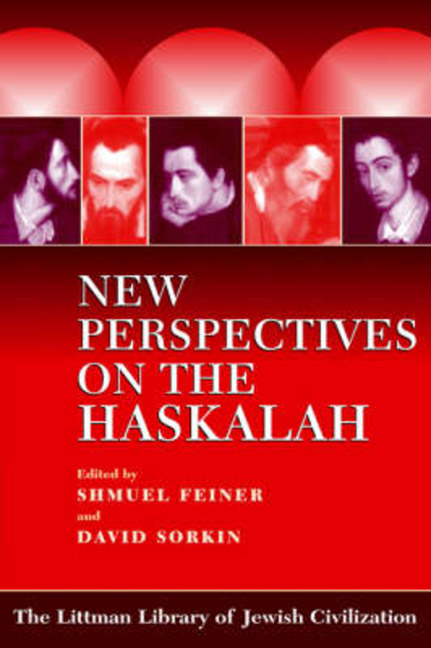Book contents
- Frontmatter
- Preface
- Contents
- Note on Transliteration
- Introduction
- 1 The Early Haskalah
- 2 Naphtali Herz Wessely and the Cultural Dislocations of an Eighteenth-Century Maskil
- 3 Enlightenment Values, Jewish Ethics: The Haskalah's Transformation of the Traditional Musar Genre
- 4 Was there a ‘Haskalah’ in England? Reconsidering an Old Question
- 5 Strategy and Ruse in the Haskalah of Mendel Lefin of Satanow
- 6 The Struggle of the Mitnagedim and Maskilim against Hasidism: Rabbi Jacob Emden and Judah Leib Mieses
- 7 Magic and Miracle-Workers in the Literature of the Haskalah
- 8 Portrait of the Maskil as a Young Man
- 9 Reality and its Refraction in Descriptions of Women in Haskalah Fiction
- 10 Enlightened Rabbis as Reformers in Russian Jewish Society
- 11 Towards a Historical Definition of the Haskalah
- Glossary
- Notes on Contributors
- Bibliography
- Index
11 - Towards a Historical Definition of the Haskalah
- Frontmatter
- Preface
- Contents
- Note on Transliteration
- Introduction
- 1 The Early Haskalah
- 2 Naphtali Herz Wessely and the Cultural Dislocations of an Eighteenth-Century Maskil
- 3 Enlightenment Values, Jewish Ethics: The Haskalah's Transformation of the Traditional Musar Genre
- 4 Was there a ‘Haskalah’ in England? Reconsidering an Old Question
- 5 Strategy and Ruse in the Haskalah of Mendel Lefin of Satanow
- 6 The Struggle of the Mitnagedim and Maskilim against Hasidism: Rabbi Jacob Emden and Judah Leib Mieses
- 7 Magic and Miracle-Workers in the Literature of the Haskalah
- 8 Portrait of the Maskil as a Young Man
- 9 Reality and its Refraction in Descriptions of Women in Haskalah Fiction
- 10 Enlightened Rabbis as Reformers in Russian Jewish Society
- 11 Towards a Historical Definition of the Haskalah
- Glossary
- Notes on Contributors
- Bibliography
- Index
Summary
EVEN though the Haskalah movement ended a century ago it remains exceptionally difficult to define it precisely. Unlike other agents of change in modern Jewish history, the Haskalah had no ideological and institutional coherence, comprehensive organization, constitution, generally agreed programme, principles, or allegiance to a specific defined ideology. Although the term ‘Haskalah’ was so continuously used that it was at the epicentre of bitter polemics and on everyone's lips, it remains ambiguous and elusive since every modern Jew was identified as a maskil and every change in traditional religious patterns was dubbed Haskalah.
The European Enlightenment met a similar fate, and until recently many scholars were totally frustrated by attempts to find a common denominator for what appeared to be a motley collection of national, religious, and local Enlightenments, philosophes, and Aufklärer of different and even contradictory kinds. ‘Within limits’, writes the English historian Norman Hampson, ‘the Enlightenment was what one thinks it was … There does not seem to me much point in attempting any general definition of the movement. Such a definition would have to include so many qualifications and contradictions as to be virtually meaningless.’
Despite these difficulties, we should not abandon all systematic attempts at arriving at a historical definition of ‘Haskalah’. On the contrary, the fact that the Haskalah eludes efforts to place it within an ideological and chronological framework, a locality, and defined institutions makes it all the more imperative to grapple with the question of definition. In addition, the new research that enriches our knowledge of the movement's history, personalities, and ideas, as well as advancing new interpretations, compels us to come to grips with the fundamental question: how is the term ‘Haskalah’ to be understood? What were the affinities between Haskalah and Enlightenment? What were its geographical boundaries, local centres, and chronological limits, its basic assumptions, thought patterns, programmes, and methods of activity? Finally, in what ways was the Haskalah connected to the pro cesses of modernization and secularization? The absence of dictionaries and lexicons of Jewish historical terms does not absolve students of Jewish history from the attempt to delineate the context and chronology of the Haskalah.
- Type
- Chapter
- Information
- New Perspectives on the Haskalah , pp. 184 - 220Publisher: Liverpool University PressPrint publication year: 2001

